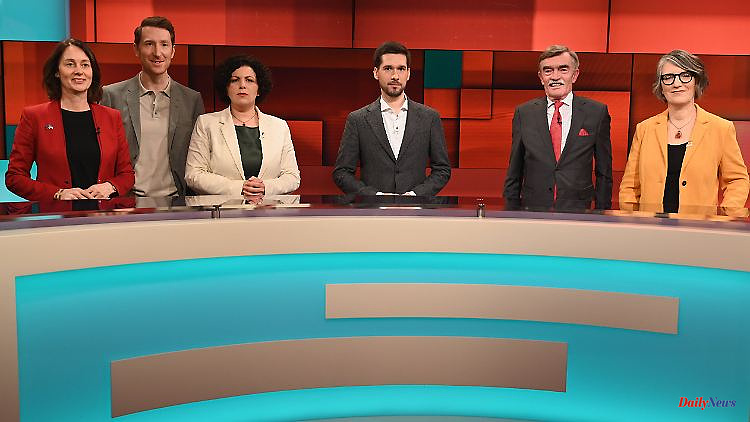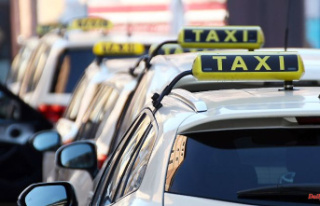Almost a year after the Russian invasion of Ukraine, it is completely unclear when and how the war will end. In "Hart aber fair" the guests deliver a very heated discussion about arms deliveries and the possibilities of diplomacy. Also present: the Deputy Foreign Minister of Ukraine, Andriy Melnyk.
On February 24, 2022, the Russian attack on Ukraine began. At the time, Russian President Vladimir Putin assumed that his army could completely occupy the country within a very short time. He should be wrong. The war has been going on for almost a year now, and there is no end in sight. A few days ago, left-wing politician Sahra Wagenknecht and women's rights activist Alice Schwarzer called for a peace demonstration on February 25 in a YouTube video. At the same time, they called for immediate peace negotiations in an online petition.
With "Hart aber fair" on ARD, the guests on Monday evening have a heated discussion that is also about it. Former NATO general Hans-Lothar Domröse, who is in favor of arms deliveries to Ukraine, is critical of Schwarzer and Wagenknecht's position. "It's essentially about the country's survival, and like many in Germany I am in favor of doing everything we can to ensure Ukraine's survival," he says. Weapons deliveries from the West are necessary because Russia brings hundreds of battle tanks to the front every week, uses hundreds of thousands of reservists and is preparing a second partial mobilization. "There's a tremendous front coming towards us."
The European states have already achieved a lot, stresses the Vice President of the European Parliament, Katarina Barley: "We all made it clear together: Such a brutal attack, which violates international law, doesn't just happen the way Putin imagined." The Russian President did not count on the resistance of the Ukrainian soldiers and the unity of the western world. Without the arms shipments, Ukraine would not have been able to defend itself for so long.
"But what has not been achieved is that the war ends. That should actually be the top priority," counters Left Party leader Amira Mohamed Ali. She signed the petition from Sahra Wagenknecht and Alice Schwarzer. In her opinion, the announcement of the supply of main battle tanks had already led to a further escalation of the war. Germany has not campaigned for peace talks or at least called for a ceasefire.
"The problem with armistice negotiations is that you say to some: stop attacking, and to the others: stop defending yourselves," says Barley, explaining the German policy. Diplomacy is important. There is still talk going on behind the scenes. But Putin invaded Ukraine with the aim of annexing the country. "The only thing Ukraine can do is defend itself. And we have a legal right and a moral obligation to support this country."
But the question is how this support could look like, according to Mohamed Ali. "Leading military leaders also say that Ukraine cannot defeat Russia. And one has to ask oneself how this war can be ended so that more people don't die." Brazil's President Lula has called for a format for international peace talks that should also include countries like China or India that work with Russia. "These are very sensible things to support now."
This is also the opinion of Domröse, who otherwise does not support the left-wing politician. "In my view, there is no political strategy," he says. At the moment, however, it is about the military defense of Ukraine, and the main battle tanks promised by Germany could not do much, but they could do something. However, fighter planes are more important. The front in eastern Ukraine is 1,500 kilometers long, explains the military strategist. Fighter jets are able to defend areas under attack from Russia very quickly.
Moderator Klamroth Barley asked whether Germany could sooner or later decide to deliver combat aircraft. She evades: She will not talk about it in a talk show format. However, if you listen to the soft overtones, you can guess that Chancellor Scholz could be ready to agree to the deliveries.
Left-wing politician Mohamed Ali asks what will happen next. Turning to Domröse, she says: "If you want the war to end quickly, NATO should go in now. But they don't do that because we know that it will have serious consequences. But we run the risk of that happens."
"Whether we like it or not, the war can only be ended on the battlefield," said Ukraine's Deputy Foreign Minister Andriy Melnyk. The former Ukrainian ambassador in Germany is briefly switched to the program from Kiev. "What Ms. Mohamed Ali is saying sounds harmless. But have you seen the new Russian textbooks where the occupied parts of Ukraine are already part of Russia?" he asks. No Russian delegation will negotiate the cession of these areas. "That would be treason. That takes your arguments ad absurdum," he addressed the left-wing politician directly.
Russia wants to keep destroying Ukraine. That's why it's now a question of rapid arms deliveries, says Melnyk. But: "We're not demanding ground troops, as Ms. Ali suggested. We're only demanding what doesn't make Germany a party to the war. That's why I want to make it very clear: It's all about arms deliveries."
Melnyk hopes that Germany can be part of a coalition that also provides fighter jets. "Germany is one of Ukraine's most important allies. And that's a good thing. The Germans can be proud of what they've achieved," he emphasizes. No artificial red lines should be drawn now, the time factor is crucial. "It is now important that the German government responds to what is important to us."












